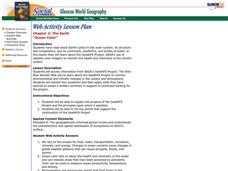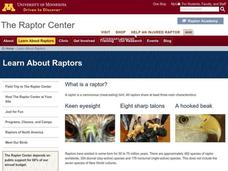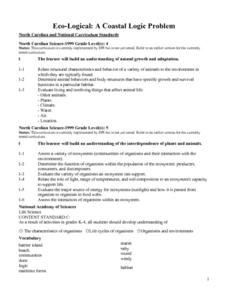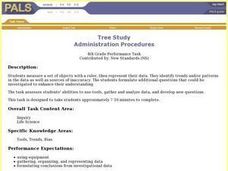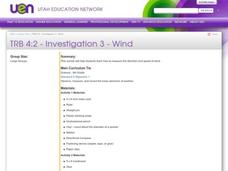Curated OER
Oh Nuts! - Calories Count
Students measure and record the mass of the nut to be tested to the nearest 0.01 gram.
Curated OER
Ocean Color
Students examine NASA's SeaWiFS Project Web site to explore how the SeaWiFS Project monitors environmental and climatic changes in the oceans and atmosphere. They answer questions and write a summary in support of continued funding for...
Curated OER
Angles: Angles, Angles, Everywhere
Students estimate and accurately measure the size of angles communicate with the appropriate geometric terms and symbols to describe and name angles, lines, line segments, rays
Curated OER
Barnacles: Harder than Cement
Fourth graders watch the movements of the complex animal hidden inside the tiny barnacle shells. This lesson allows students to study the behavior, adaptation, and larval stage of the barnacle.
Curated OER
Weather Journal Log
Students discuss the weather each day and log it on a class chart for a month.
Curated OER
Liquid Crystal IR Detector
Students experiment with one method of detecting infrared radiation. They simulate the detection of infrared radiation using a liquid crystal sheet.
Curated OER
Meteorologist for a Day
Students research weather patterns, predict the weather for a US city and write a weather forecast that be presented to the class. The forecast should explain their weather prediction and the weather patterns and conditions it is based on.
Curated OER
River Study
Students study physical features of a local stream. They study how to identify water features on topographic maps.
Curated OER
Analyze the Results
Students conduct water tests and sample macroinvertebrates from a nearby source to make a general determination about the overall quality of water. They use worksheets and analyze data as part of a larger unit.
Curated OER
Eco-Logical: A Coastal Logic Problem
Fourth graders study the characteristics of five coastal communities. They use logic cards and matching activities to identify the proper community for plant and animal species.
Curated OER
Tree Study
Students measure the lengths of provided leafs to the nearest millimeter. Students identify trends in the data as well as sourced of inaccuracy and formulate additional questions that could be investigated to enhance their understanding.
Curated OER
Happy the Fish
Students explore the ways in which people's actions affect fish. They discuss pollutants that are in the water. Students define the terms chemicals, cooling pond, and pollutant. They create a book about Happy the Fish.
Curated OER
Observing the Development of Drosophila in Apple Juice Agar
Students observe the development of the Drosophila fly. They observe the first two stages - the egg and the 3 larval instars. They observe the culture every day for 8 days using a stereo dissecting microscope.
Curated OER
Winer Survival
Students study how animals need water, food, shelter, and space to survive. They also study what animals need to survive in the winter. They play the part of animals and winter "threats" in a game of tag to reinforce concepts.
Curated OER
Wind
Fourth graders are read a story and answer the comprehension questions about sound and wind. In groups, they make their own wind vane and how to determine the direction of the wind. To end the lesson plan, they make their own Anemometer...
Curated OER
Feedback and Flowcharts
Sixth graders explain what a negative feedback system is and they distinguish it from a positive feedback system. They describe examples of how negative feedback is used in both nature and technology. , Students define homeostasis, and...
Curated OER
Birds of Wisconsin
First graders explore the job done by ornithologists. They role play identifying the characteristics that make a bird a bird. They discuss what makes each bird species unique. Students are introduced to Wisconsin's most common and rare...
Curated OER
Desert Animals
Students are asked if they think a roadrunner is a bird that is a fast runner or a slow runner? They are given a copy of Roadrunner Display Sheet. Students are asked how does a roadrunner protect iteself? They are given the following...
Curated OER
Healthcare
In this health care activity, students, with a partner, discuss and complete a variety of activities associated with health care and doctors.
Curated OER
Science Quiz-General Knowledge
For this science quiz worksheet, students complete a set of 20 true or false questions covering a variety of general science topics. An answer key is included.
Curated OER
Soil Comparison and Analysis
Students perform tests on different soil samples. In this earth science activity, students classify the soil into groups according to test results. They write a lab report following a certain criteria.
Science Buddies
Science Buddies: Can Your Body Temperature Tell the Time of Day?
If you have ever had to adjust to a new time zone, you have noticed that it takes a while before you start to feel normal again. By shifting your sleep and activity schedule, you have altered the pattern of your body's circadian rhythms....
Other
Temperature of a Healthy Human (Body Temperature)
This site has several charts with explanations why your body temperature might not be 98.6 degrees fahrenheit.
PBS
Pbs Learning Media: Body Breakdowns at High Altitudes
This interactive feature from the NOVA: "Surviving Denali" Web site details the variety of ways the body can fail while climbing a high-altitude peak.
Other popular searches
- Body Temperature Regulation
- Body Temperature Control
- Body Temperature in Animals
- Normal Body Temperature
- Control of Body Temperature
- Altered Body Temperature
- Controlling Body Temperature
- Measuring Body Temperature
- Body Temperature Taking
- Maintaining Body Temperature
- Body Temperature Regualation
- Altered Body Temperature Ppt



